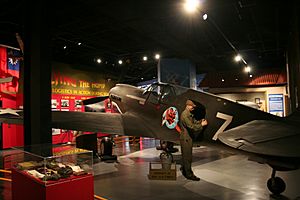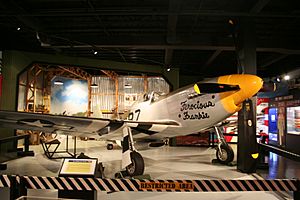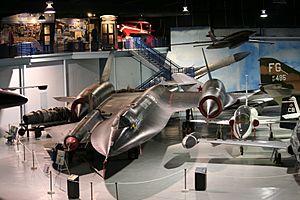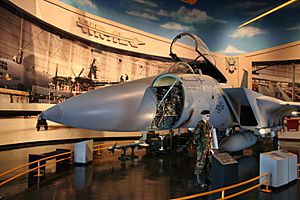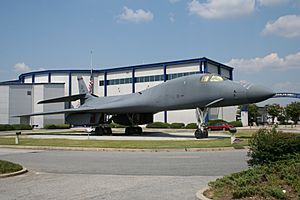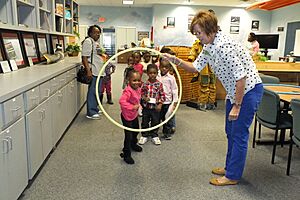Museum of Aviation (Warner Robins) facts for kids
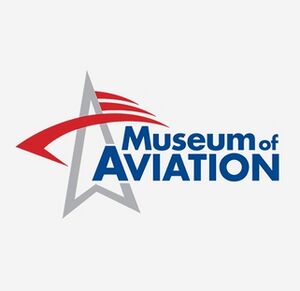 |
|
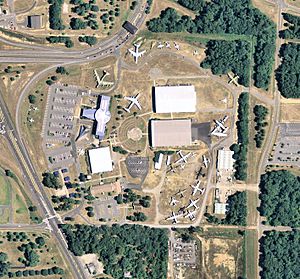
2006 aerial photo of museum buildings and aircraft
|
|
| Lua error in Module:Location_map at line 420: attempt to index field 'wikibase' (a nil value). | |
| Former name | Southeastern Museum of Aviation |
|---|---|
| Established | 1981 |
| Location | Robins Air Force Base, Georgia |
| Type | Military aviation museum |
| Owner | United States Air Force |
The Museum of Aviation is a super cool place to learn about airplanes and space! It's the second-biggest aerospace museum run by the United States Air Force. You can find it right outside Warner Robins, Georgia, close to Robins Air Force Base.
As of 2019, the museum had four main buildings filled with exhibits. It also displayed more than 85 historic aircraft. All of this is spread out over 51 acres of land. The museum is also home to the Georgia Aviation Hall of Fame. Lots of people visit each year, almost half a million! Admission is free, making it one of the most visited museums of the United States Department of Defense.
Contents
History of the Museum
The Museum of Aviation first started as the Southeastern Museum of Aviation. It was founded in 1980. A pilot from World War I, Guy Orlando Stone, offered his collection of aviation items. He said the base could have them if they built a museum to keep them safe.
How the Museum Began
The Air Force agreed to the museum idea in late 1980. A non-profit group, the Southeastern Museum of Aviation Foundation, was created in 1981. Local people and base officials helped make this happen. In 1981, the Air Force also started a program to save its history. The museum became a part of this important effort.
Early Years and Opening
The museum opened its first office in 1982. This happened after they got another private collection of items. That same year, the Air Force approved the museum's ten-year plan. People started raising money to build a permanent museum. They needed $9.5 million for construction.
The museum's first airplane arrived in 1983. By the end of that year, they had collected 27 airplanes! The museum officially opened to the public in November 1984. It had 20 planes ready for display, and 20 more were being fixed up.
Growing and Expanding
By 1988, the museum's name changed to the Museum of Aviation at Robins. In 1989, the governor of Georgia, Joe Frank Harris, signed a law. This law created the Georgia Aviation Hall of Fame, which is located at the museum. Guy Orlando Stone, who helped start the museum, was one of the first people honored there.
In the 1990s, the museum grew even more. They added "Hangar One," which was a former aircraft hangar. In 1992, they opened a new 60,000-square-foot building. This building was later called the Eagle Building. It had a theater, a diorama, and more aircraft. In 1996, the "Century of Flight Hangar" added another 60,000 square feet of space.
In 2013, the museum decided to remove 32 aircraft from display. Some of these planes went to other museums. Others were taken apart on site. In 2019, the museum showed a new statue of Eugene Bullard. He was the first African-American pilot to fly in combat. Bullard was from Columbus, Georgia. He flew for the French Air Force during World War I. He was honored by the U.S. Air Force in 1994.
In June 2024, a team worked to move a C-47 plane to the museum. They took it apart at the Museum of Alaska Transportation & Industry first.
Aircraft on Display
The Museum of Aviation has many different types of aircraft. You can see bombers, cargo planes, fighters, and helicopters. They also have missiles, drones, and trainer planes.
Bombers
- Boeing B-17G Flying Fortress
- Boeing B-29B Superfortress
- Boeing B-52D Stratofortress
- Douglas VB-26B Invader
- Douglas WB-66D Destroyer
- Lockheed P-2H Neptune
- Martin B-57B Canberra
- Rockwell B-1B Lancer
Cargo Aircraft
- Beechcraft C-45G Expeditor
- Boeing EC-135N
- Boeing KC-97L Stratofreighter
- Cessna UC-78 Bobcat
- Curtiss C-46D Commando
- de Havilland Canada C-7A Caribou
- Douglas C-47A Skytrain
- Douglas C-54G Skymaster
- Fairchild C-119C Flying Boxcar
- Fairchild UC-123K Provider
- Douglas C-124C Globemaster II
- Lockheed AC-130A Spectre
- Lockheed C-130E Hercules
- Lockheed C-141C Starlifter
- Lockheed EC-121K
- Lockheed VC-140B
Fighters
- Cessna A-37A Dragonfly
- Convair F-102A Delta Dagger
- Convair F-106A Delta Dart
- Curtiss P-40N Warhawk
- Fairchild Republic A-10A Thunderbolt II
- General Dynamics F-16A Fighting Falcon
- General Dynamics F-111E Aardvark
- Lockheed F-80C Shooting Star
- McDonnell F-101F Voodoo
- McDonnell Douglas F-4D Phantom II
- McDonnell Douglas F-15A Eagle
- McDonnell Douglas F-15A Eagle (gate guardian)
- McDonnell RF-101C Voodoo
- Mikoyan-Gurevich MiG-17
- Mikoyan-Gurevich MiG-21
- North American F-86H Sabre
- North American F-100D Super Sabre
- North American P-51H Mustang
- Northrop F-89J Scorpion
- Republic F-84E Thunderjet
- Republic F-105D Thunderchief
Helicopters
- Bell UH-1F Iroquois
- Bell UH-1P Iroquois
- Kaman HH-43A Huskie
- Sikorsky H-19D Chickasaw
- Sikorsky HH-3E
- Sikorsky MH-53M
- Vertol CH-21B Workhorse
Missiles and Drones
- AIM-4D Falcon
- AIM-4E Falcon
- AIM-4F Falcon
- AIM-4G Falcon
- AIM-9L Sidewinder
- AIM-26A Falcon
- AIM-120 AMRAAM
- AIR-2A Genie
- AGM-28 Hound Dog
- AGM-88 HARM
- AGM-136A Tacit Rainbow
- AQM-34N Firebee
- AQM-34V Firebee II
- BQM-34A Firebee
- BQM-34F Firebee II
- Lockheed D-21
- MGM‐13A Mace
- MQM-107D Streaker
- Northrop Grumman RQ-4A Global Hawk
- TM-61A Matador
- YCGM-121B Seek Spinner
Trainers
- Boeing-Stearman PT-17 Kaydet
- Cessna T-37B Tweet
- Fairchild PT-19A
- Lockheed T-33A
- North American T-6G Texan
- North American T-28A Trojan
- North American T-39A Sabreliner
- Ryan PT-22 Recruit
- Vultee BT-13A Valiant
Special Aircraft
- 1896 Chanute Glider
- Aeronca 7AC Champion
- Cessna O-1E Bird Dog
- Cessna O-2A Skymaster
- Cessna U-3B
- de Havilland Canada U-6A
- Epps 1912 Monoplane
- Grumman HU-16B Albatross
- Helio U-10D
- Laister-Kauffman TG-4A
- Lockheed SR-71A Blackbird
- Lockheed U-2D
- Rockwell OV-10 Bronco
- Stinson L-5E Sentinel
The Fastest Plane: SR-71 Blackbird
The SR-71 Blackbird on display is super special. It holds the record for the fastest flight speed ever! On July 28, 1976, this specific plane (serial number 61-7958) flew at an amazing speed of 1905.81 miles per hour. That record still stands today!
Education Center
The museum has a special education center called the National STEM Academy. This is a non-profit group. The academy offers fun field trips and other programs. These programs mix STEM subjects (Science, Technology, Engineering, and Math) with things like history and literature.
The programs help kids learn about different career options. They also help develop skills for future jobs. You can join activities, workshops, and special events at the museum. They also offer programs at schools and even virtual field trips online!
See also
- List of aerospace museums
 | DeHart Hubbard |
 | Wilma Rudolph |
 | Jesse Owens |
 | Jackie Joyner-Kersee |
 | Major Taylor |


